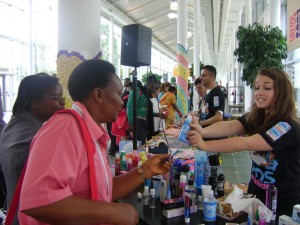Strong in the broken places
Monday, July 26th, 2010 by Delta NdouStrong in the broken places
I often wonder what ignites the passion for activism and what motivates individuals to care enough about the plight of others to place themselves on the firing line.
One of the things I discovered about the 24 young women that are taking part in the Moremi Initiative for women’s leadership and development in Africa (MILEAD) here in Ghana is that their passions derive from some of their most painful and deepest hurts.
In essence, they have risen against all odds to face their pasts and use their own pain to alleviate the suffering of others, prevent the possibility of similar pain being inflicted on others and wherever possible to use their experiences to reach out to others.
I once read a daily devotional that was titled, “strong in the broken places” and I never could really understand the meaning of that phrase.
But now I realize that there is strength to be derived from the lessons we learn when life’s tragedy breaks us down.
It all started with a seminar on child sexual abuse, gender violence and all the inherent complexities of these social ills and turned into a cathartic experience when one of the fellows shared a personal horror story.
Herlyn Uiras was diagnosed with HIV after she was raped by a truck driver who had offered her lift smuggled her into South Africa at the age of 16 and dumped her in Johannesburg miles from her country of origin – Namibia.
Herlyn’s story is heartrending, spine-chilling and life-transforming, proving the remarkable resilience of the human spirit and the triumph that comes with choosing to be a survivor and not victim of life’s endless tragedies.
“My friend and I wanted to see what Joburg was like and that truck driver said he could get use into SA. We were excited, we were 16, we were on an adventure. The moment he got us across the border he demanded sex, I refused but he went ahead anyway and when I saw that he would do it anyway, I begged him to use a condom. He wore one but it broke while he was at it. He didn’t stop. And I couldn’t stop him.”
The way Herlyn tells her story is striking in two ways; first she owns the consequences of her choices, specifically the choice to trust a stranger with her life.
She stayed 5 months in South Africa, surrendered herself to the police and was given passage back to her country.
Today Herlyn is 26, working with AIDS organisations to sensitize young children about the disease and is engaged in projects to discourage human smuggling and warn people about the dangers of human trafficking.
Prior to the earth-shattering revelations she made about what she went through, I had already created a profile of her in my mind, as I did with every other young woman I had met there.
I had profiled her as one of the fun-loving, side-splittingly hilarious women I have ever come across.
One would never guess at the sound of her infectious laughter that her life had been touched by such trauma and tragedy – though it wasn’t easy, Herlyn says she got to the point where she made peace with what had transpired – forgiven herself and even managed to somehow forgive the man who had raped and infected her.
As she told her story, she was so composed and we all listened disbelieving because although she spared us the details, most of us could still feel our skins crawl and imagine how she must have felt.
Then somewhere along the narration something just broke in her – she cried and we cried. Cried for that 16 year old girl who didn’t know any better and cried for the woman standing before us, who ten years later re-lives the nightmare to help others and to warn others by sharing her life story across the continent.
I have no way of knowing who’s life may be helped or saved by sharing Herlyn’s story with readers who follow Kubatana’s blogs, but there is no doubt in my mind that her story will help someone, somewhere to either avoid what befell her or choose to overcome whatever pain was inflicted on them.
Having received a fully-packed programme scheduled with back to back lectures and activities lined up for us, I went to Ghana expecting to be taught but when I got here – I found myself learning. Learning the meaning of what it means to be strong, strong even in the broken places.










